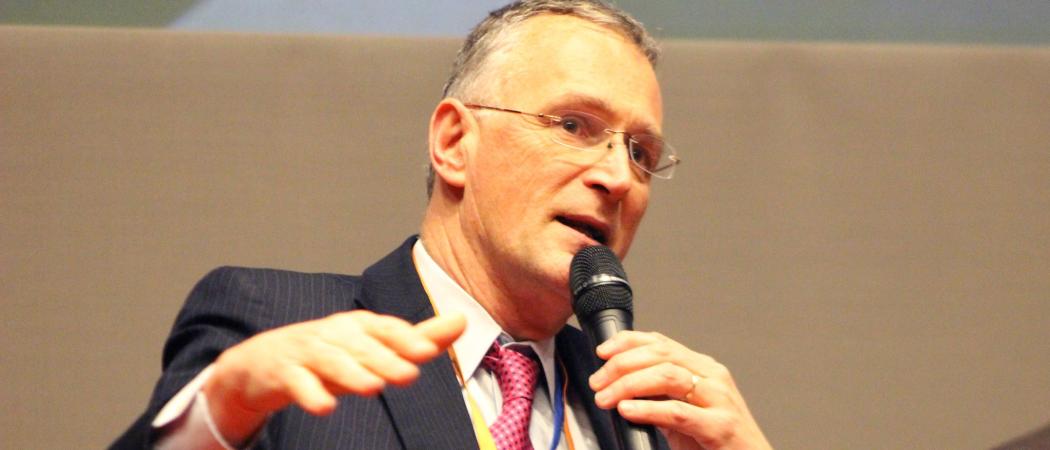Ex-ERC chief defends his record and says he remains a supporter of the ERC’s objectives

Photo: Lysiane Pons, Science|Business
The ex-president of the European Research Council has rebutted claims he did not properly engage with the job, saying he never missed a meeting “where my attendance was required” and “always respected all the terms and conditions of my employment agreement.”
Mauro Ferrari, who stepped down last week after only three months in the post, was responding to criticism by the ERC’s scientific council, the body of 19 eminent scientists which defines the ERC’s funding strategy - and which he as president led.
During his short tenure, the Italian-American scientist kept his positions as affiliate professor in pharmaceutical science at the University of Washington and as a member of the board of the US biotech company, Arrowhead Pharmaceuticals. Mauro was still in receipt of payment for his work at Arrowhead, which the commission approved before he joined the ERC.
Ferrari said, any “external activities I engaged in, in the US and in Europe, were only those that had been pre-approved by my employer. These activities were approved by the European Commission, “without any negative feedback”.
In his point by point rebuttal Ferrari says, “I hereby authorize the [European Commission] to release and publish the terms of my employment contract, which was as special advisor to the Commission. I was employed part-time (80 per cent), with explicit pre-approval by the signing Commissioner for my declared external activities.”
Ferrari’s resignation note, released via the Financial Times, described a breakdown in relations between himself and the other members of the scientific council over how the ERC should respond to the COVID-19 pandemic that has blazed through Europe.
In response, the scientific council issued a statement saying that they had asked him to resign two weeks earlier, citing his “complete lack of appreciation for the raison-d’être of the ERC” and saying his work activities outside the ERC “appeared on several occasions to take precedence over his commitment to ERC”.
On his part, Ferrari claims the time he spent on his ERC work was “much greater than was stipulated by my contractual obligations.” There were “never was any conflict of interest, since all of my activities were screened for conflicts,” he said.
The scientific council also said Ferrari had run “several personal initiatives” within the commission, without consulting them, and “using his position to promote his own ideas”.
In response, Ferrari says, “My only initiative not involving the ERC came in response to a direct request from [Commission] President von der Leyen. It did not involve matters that pertained to the ERC, but rather questions of public health strategies, concerning the COVID-19 pandemic. The document I prepared for her, once completed, was circulated at her request to a distribution list she communicated, which did not include the ERC. I followed her instructions at every step of the way.”
A commission spokesman last week said, “President von der Leyen did not solicit any proposals from Professor Ferrari.”
Describing how events reached a point of no return, Ferrari says the scientific council had “unanimously rejected the motion that we even meet to discuss” his proposal to create a hands-on funding initiative for COVID-19.
“That in my mind was an irreversible step of separation. Given the magnitude of this tragedy, and the fact that the ERC supports some of the best scientists in the world, I thought it ethically imperative at least to meet and discuss if there was any way that we could help,” he said.
Ferrari, who is back living in the US, says he will soon announce “a broad portfolio of coordinated strategies” that will address COVID-19. He did not elaborate on who would be involved in his plan, although he ruled out participation from the University of Washington and Arrowhead.
In the statement released via the Financial Times, Ferrari said he had lost faith in the EU system. However, he acknowledges some of the efforts against COVID-19 funded from the EU’s Horizon 2020 research programme. He also cites “excellent” clinical trial coordination and selection work done for new drugs and vaccines by the European Medicines Agency.
“I will always be a great supporter of the ERC and the bottom-up programmes it funds; my respectful suggestion now from the outside is that the ERC should be more effectively connected to focussed initiatives and innovation programmes,” Ferrari said.





 A unique international forum for public research organisations and companies to connect their external engagement with strategic interests around their R&D system.
A unique international forum for public research organisations and companies to connect their external engagement with strategic interests around their R&D system.